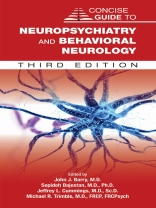For nearly 30 years, the Concise Guide to Neuropsychiatry and Behavioral Neurology has been an indispensable companion for clinicians caring for patients struggling with everything from delusions and hallucinations to aphasia and stroke.
This third edition combines all of the scientific rigor of its predecessors with a renewed emphasis on kind, empathetic care. It has been updated to account for the development of new techniques in brain imaging; improvement in electrophysiological methods to better detect epilepsy and sleep disorders; and a growing list of blood and spinal fluid biomarkers that have revolutionized diagnostic capability.
Readers will benefit from guidance on novel treatments and improved therapies for a range of disorders that includes • Memory disorders• Movement disorders• Brain tumors• Substance related disorders• HIV neurocognitive disorders
A wealth of tables throughout the book will help busy clinicians quickly reference relevant information, regardless of the patient’s presentation. And an extensive list of recommended readings opens the door to further study.
As useful for trainees as it is for the experienced practitioner, the Concise Guide to Neuropsychiatry and Behavioral Neurology, Third Edition offers the latest science and expert guidance to both achieve accurate diagnosis and undertake effective management of patients with complex neuropsychiatric and neurobehavioral disorders.
Tabla de materias
Chapter 1. Neuropsychiatric Assessment Chapter 2. Behavioral Neurobiology Chapter 3. Symptoms and Syndromes Chapter 4. Unexplained Neurological Syndromes Chapter 5. Frontal Lobe Syndromes Chapter 6. Aphasia and Related Syndromes Chapter 7. Visual, Visuospatial and Right and Left Brain Disorders Chapter 8. Memory and Its Disorders Chapter 9. Epilepsy and Limbic System Disorders Chapter 10. Delirium Chapter 11. Dementia Chapter 12. Movement Disorders Chapter 13. Stroke Chapter 14. Brain Tumors Chapter 15. White Matter Diseases Chapter 16. Head Injury Chapter 17. Substance Related Disorders Chapter 18. Autism Chapter 19. Endocrine Disorders – Thyroid and Adrenal Chapter 20. Limbic Encephalitis Chapter 21. HIV Neurocognitive Disorders Chapter 22. Treatment of Neuropsychiatric Disorders Chapter 23. Interventional Neuropsychiatry
Sobre el autor
John J. Barry, M.D., is Fellowship Director of Neuropsychiatry and Behavioral Neurology, Director of the Neuropsychiatry Clinic, Co-Director of the Individual Psychiatry Clinic, and Professor of Psychiatry and Behavioral Sciences in the Department of Psychiatry and Behavioral Sciences at Stanford University School of Medicine and Stanford University Hospital in Stanford, California.
Sepideh N. Bajestan, M.D., Ph.D., is Chief of Neuropsychiatry Services, Associate Director of the Neuropsychiatry and Behavioral Neurology Fellowship, Co-Director of the Individual Psychotherapy Clinic, and Clinical Associate Professor in the Department of Psychiatry and Behavioral Sciences at the Stanford University School of Medicine in Stanford, California.
Jeffrey L. Cummings, M.D., Sc.D., is Director and a Research Professor for the Chambers-Grundy Center for Transformative Neuroscience, Department of Brain Health, School of Integrated Health Sciences at the University of Nevada Las Vegas in Las Vegas, Nevada. Michael R. Trimble, M.D., FRCP, FRCPsych, is Emeritus Professor in Behavioural Neurology at the Queen Square Institute of Neurology, University College London, in London, United Kingdom.












